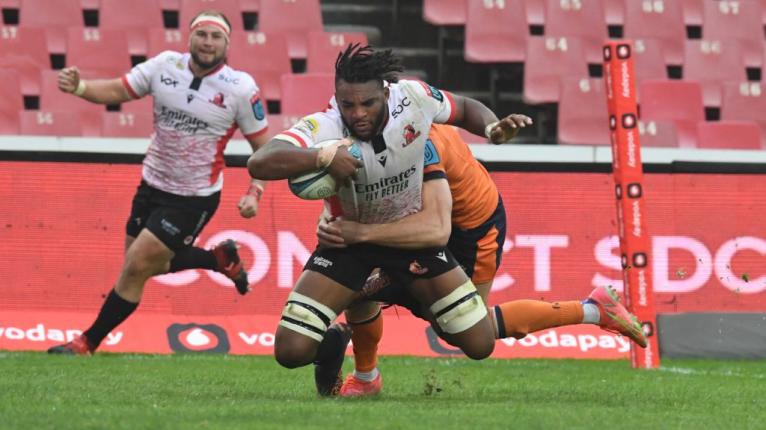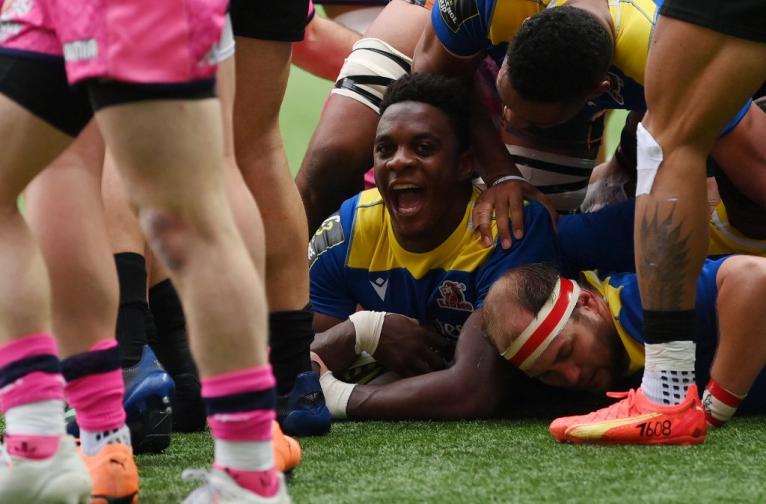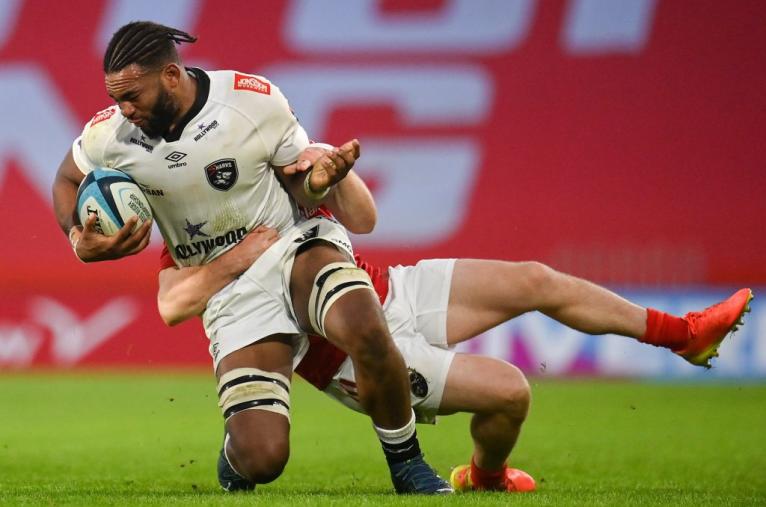Simon and Fatima Tshituka looked around their Congo neighbourhood, looked at the political unrest which simmered dangerously near, and looked at their four young sons. They saw conflict raging. They saw children whose education was cut short, or who simply never went to school at all. They decided little good would come from raising a family here. It was time to leave.
That was in 2002. The Tshitukas moved to Johannesburg as refugees, and there they have remained for over 20 years. Simon and Fatima resolved to do whatever it took to give their boys the best start possible. Simon had an entrepreneurial streak, a hustler to his core. He gathered and sold scrap metal, and the money he took home kept the wolf from the door while Fatima cared for the kids.
In those austere days, none of the Tshitukas had heard of rugby, let alone imagine the impact it would have on their family. They could never have foreseen the searing rise of the middle two children, Vincent and Emmanuel, from ballroom dancer and talented track athlete to the Lions, the Sharks, and maybe, just maybe, the green and gold jersey itself.

Nor, for that matter, did the Tshituka brothers know how desperate the early times were. Vince and Manu are at pains to stress theirs is no sob story. Childhood was joyous, rich in love and community if not rand and possessions.
“We never saw our dad go through the hardship,” says Manu, who at 23, is two years younger than Vince. “Only when we got older my mum would say, ‘this year we had nothing, but your dad just kept pushing’. Some of the jobs he would take were really degrading for him but he would do them without us knowing. Sometimes he’d have to go and look in people’s garbage and to find metal to salvage and sell. But he’d do that when we were in school, we never knew about it.
“Sometimes the lights hadn’t been on for three months, there wasn’t as much food in the fridge and then you would know, okay, maybe money is tough. But my dad never let that define him. He always got up even if he had absolutely nothing. I really take my hat off to him for that.”
Vince, being older, had more of an idea, but he was never exposed to the suffering.
“My parents protected us so well from the pain they went through,” he says. “My mum could be crying in the bedroom but she’d never let us see it. There was no money but we still had each other and loved each other. The adults took all the bullets and protected us from everything. Every time I look back it just humbles me – money makes things easier but money is not happiness. Having true love around you, people who love and support you, is the best gift anybody could get.”
My dad actually told me at one point, ‘leave rugby altogether, I’ll find a way to pay your school fees, just study and get that done’.
The Tshitukas attended a small school with no rugby pedigree. It barely registered a blip on the packed South African radar. Vince was a flamboyant dancer, forming a hip-hop group for talent shows called Fusion X. Manu was such a brilliant sprinter he was offered a full NCAA scholarship by a prominent US college. Even with the fees covered, the move would have stretched family finances beyond breaking point.
“I had to pay for the accommodation and day to day living by myself and that was just too expensive for us,” he says. “Converting to the dollar to the rand, the rand was quite weak, so that wasn’t something I was able to do.”
But this was South Africa, and for two muscular boys of 6ft 5ins, with V8 engines and blistering pace, the pull of rugby was inevitable. Vince took to the sport emphatically. Within a few years, he was knocking on the door of the Lions academy. Manu was still so wedded to athletics he quit the esteemed Grant Khomo provincial squad at 16. His coach thought the boy’s brain had fallen out.
Simon, too, regarded rugby with suspicion. Vince was heading to the University of Johannesburg to study IT and become an app developer. His excellence on the pitch had earned him a 40% scholarship. Manu would soon be admitted to ‘Wits’, another prestigious Joburg institution, to read law. But in their father’s eyes, rugby would yank the boys away from their books and their studies and the future he had fought with every sinew to make possible.

“My dad was against rugby not because he didn’t like rugby,” Vince says. “Nobody believed it would be a career – not even myself. He thought more than anything it would be a distraction, tire me out and not have time to put in the hours at university. And honestly, it wasn’t a lie.
“When I joined the Lions, my marks dipped. It did distract me, it did take a lot of my time but I felt like I was too close… I could be the first person to do this so why would I stop now?
“My dad actually told me at one point, ‘leave rugby altogether, I’ll find a way to pay your school fees, just study and get that done’. I went to my mum and negotiated and begged and just told her, ‘let me have this year’.
“I didn’t have a contract then – I was on a trial – and a few weeks after we won the U19 competition I signed my first junior deal. That was like, now I can breathe because I can take something home, it’s doing something for me, it’s not a complete gamble. The fact it was bringing money in changed my parents’ perspective on it all.”
Dad said, ‘you guys are my spear and my shield. Whenever I’m feeling down, you shoot arrows for me and give me the strength to get up and continue.’
Suddenly, a pathway crystallised before him. Vince played a season and a half of Super Rugby before the world shut down and the South African franchises flitted north. By that time, he was earmarked as a white-hot talent, a back-row brute on the carry and in the tackle with frightening speed and a work ethic to match.
“As soon as I got in there and saw how tangible a career was, my focus and love for the game doubled and tripled because you can actually have goals and dreams to play at the highest level and win the highest awards and recognition. All of it became real and I felt like a kid again who was just hopeful to create something for themselves.”
As covid gripped the world, Manu followed Vince up the ladder. He marvelled at his brother’s feats, at the Springboks’ phone numbers now wedged in his contacts file. He made it to the Varsity Cup, then the Rainbow Cup, then the URC itself. The boys played their first professional match together against the Bulls at Loftus three years ago. Their parents and two brothers watched spellbound. Kevin, the youngest of the brood, is now wearing Varsity Cup colours and turning heads like his siblings.
“That made me feel like I’ve succeeded,” Manu remembers. “Seeing how happy they were, seeing in my little brother’s eyes how much hope I gave him. Family I didn’t even know of back in Congo were calling me to say congrats. It was one of those feelings you just can’t replicate.”
In those eighty minutes, all of Simon’s fears and cynicism melted away. He saw what his sons saw. He saw the beauty of the sport and the power it gave his boys to sparkle, influence and provide.
“Rugby just didn’t make sense to my dad, but I saw him so happy, so humbled that day,” Manu says. “He said, ‘you guys are my spear and my shield. Whenever I’m feeling down, you shoot arrows for me and give me the strength to get up and continue.’ I look up to my dad but it’s pretty cool to hear how us playing at that level inspires him to keep working harder.”
The newly moneyed Sharks took Vince to Durban last year, part of a major recruitment drive which has fetched Bok giants to Durban by the boatload. Next season, Manu will join his brother again. The Sharks have laboured terribly beneath the standards such an awesome squad shout set, but it feels like a matter of time before they start to motor. They host Edinburgh on Saturday for a place in the Challenge Cup semi-finals and with the URC a lost cause, are chucking all their considerable resources at winning Europe’s second-tier competition.
The Tshitukas are surrounded by Boks but unable to launch their own bid for Test rugby. That is because, in the eyes of the South African government, they are still, officially, Congolese refugees. Until they are granted citizenship, they will not be allowed to push for a place in Rassie Erasmus’ squad.
It seems odd two people can spend 90% of their lives in a country, and represent two of its most storied sporting organisations, and yet not be deemed eligible for national honours but such is the myriad red tape. The Sharks are lobbying to expedite the process which the Tshitukas hope is nearing its conclusion. “There’s a lot of waiting,” Vince offers, with a rueful chuckle.

Even when all this paperwork is rubber-stamped, there’s no guarantee either brother makes a ferociously competitive Springbok back-row. South Africa produces specimens like no other country and there is an eye-watering volume of unselected talent which would waltz into plenty international setups. The Tshitukas would have a chance, though. Players this good always have a chance. And an opportunity to shine as even brighter beacons for their people.
“Not just for myself or my family but a lot of kids coming from Congo, playing for the Springboks would be something cool to show, flip, against all odds you can still make something of yourselves,” Manu says. “It would change the game for those who look up to us and people from our background, how much joy and pride it would bring to our community is insane.”
Simon and Fatima Tshituka no longer fret over money. Their sons make sure of that. “You boys are my pension!” their grandmother likes to joke.
“They put so much sacrifice into us and that is the least we could do to give back to them,” Vince says. “I’m actually grateful for it and I always say, there’s something beautiful about being the underdog that only the underdog will ever really understand.”
“We never, ever felt short of love growing up,” Manu chips in. “My mum did an incredible job of teaching us how to show love and support each other in everything.
“I would play with my brothers outside, play soccer, play cards. Vince used to be quite naughty, he’d want to teach me how to steal from the little garage stores and shops. Those memories make up your childhood. I don’t really think of the tough times, I take from my childhood how my parents were always there providing and loving us, and instilling those principles in their kids. Honestly, I had an amazing childhood because of how my family were for me.”
Bureaucratic procedures are just another obstacle in this remarkable triumph against the odds.


These guys are hard workers on the field and they really stand a chance to make the Boks squad. I am amazed by the fact that they still don't have citizenship even though they have been in a country for more than 20 years. One only needs 5 years to be naturalised citizen. Something doesn't add up at all unless they're still being regarded as refugees
South Arica is not the land of milk and honey for refugees or immigrants. Many foreigners come here and are met with xenophobia, live in abject poverty and squalor in dangerous neighbourhoods, townships, slums or urban centres. They are taken advantage of and exploited and they are subject to terrible inhumane conditions at work and at home. They are often attacked indiscriminately and victimised by criminals and xenophobic groups. Yet even in such an environment young boys can thrive and rise to the top. It is truly amazing the number of high quality athletes produced in South Africa who come from these backgrounds and these boys are a shining beacon of light and an example of what can be achieved despite these circumstances.
Very insightful - great to get the full back story.